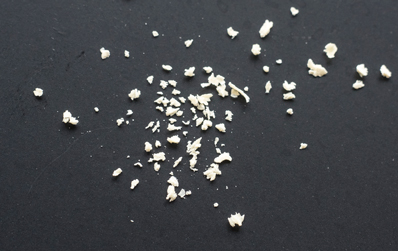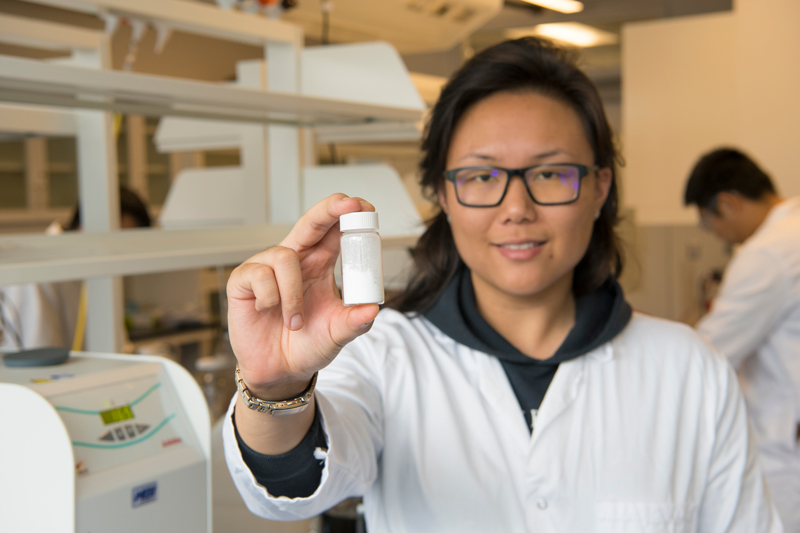Genecis, a startup company founded by students and recent graduates of the University of Toronto Scarborough (UTSC), is using current advancements in biotechnology, machine learning and microbial engineering to convert food waste into PHAs. A fully biodegradable form of plastic, PHAs can be used to make more sustainable toys, medical devices and 3D printer filament.
Luna Yu, Founder and CEO of Genecis, states:
“More than $1 trillion worth of food is wasted globally every year. What we’re able to do is take this waste and turn it into something of higher value.”
Food-based plastic
Following the collaboration with a fellow environmental science student at The Hub, UTSC’s entrepreneurial incubator, Genecis’ founders began to explore other possible products which could be made from food waste.
Yu comments, “We looked at different types of bio-rubbers and bio-chemicals before landing on PHAs. We felt it had the biggest market potential.”
PHAs (aka polyhydroxyalkanoates) are polymers produced by bacteria which have various benefits over other forms of bio-plastics. They can be developed into a thermoplastic, which can easily be turned into different products. Also, unlike many other forms of bio-plastics, the PHA won’t spoil the recycling process.
“Many people throw bio-plastics into the recycling bin rather than the compost, but if it’s not a thermoplastic it can’t be remoulded and this disrupts the physical properties of new recycled products. They will end up falling apart,” Yu said. But in case of PHAs, they won’t cause this problem even if they accidentally end up in recycling bins.
PHAs fully degrade in the environment within one year, and under 10 years in water. Whereas synthetic plastics can take more than a hundred years to degrade in similar environments.

Genecis explore 3D printing applications
Genecis uses a three-step process to develop its their PHAs. Initially, the food waste is broken down into volatile fatty acids by a bacteria culture. The fatty acids are further added to another bacteria culture specifically selected to produce PHAs in their cells. At last, an extraction process cracks open the cells, then compiles and purifies the plastic. This entire process takes place over a course of seven days, a much speedier alternative to produce like biogas which can take up to 21 days.
Genecis are exploring PHAs application potential through multi-use products like toys, 3D printer filament, flexible packaging and medical staples, stents and sutures.
At present, Genecis’ main lab in University of Toronto Banting and Best Centre for Innovation and Entrepreneurship contains high-scale bioreactors that allows completing the three-step process. Another location in Environmental Science and Chemistry Building at UTSC is responsible for research and development in searching ways to advance their production process. Later in 2019, Genecis will commence its demonstration plant with an industry partner, and it will be able to transform three tonnes of organic waste into PHAs weekly.
Within the journey of two years, Genecis has won prize money of more than $330,000 from startup competitions. Yu gives the credit of this rapid growth to the Creative Destruction Lab, The Hub, and the Hatchery, which is a startup accelerator at the Faculty of Applied Science & Engineering.

Genecis has cultured and isolated hundreds of species of bacteria which presently don’t exist in databases. Yu said, “Our goal is to create the highest value from organic waste.”
“Soon we will be able to synthesize speciality chemicals and other materials from organic waste, all at a lower cost than traditional production methods using synthetic biology.”
Those distinctive chemicals can be used in cosmetics and in the health and wellbeing industry.
Determined to enhance the green potential of 3D printing, there are many projects looking to create materials that easy to recycle and safer for the planet. In 2017, the European Union launched a €2.7 million project to create greener 3D printing materials for the automotive industry. Other efforts, including recycled space waste, coffee powder and orange peel are also in progress for the development of 3D printer materials.
Stay updated with the latest scientific developments in 3D printing by subscribing to the 3D Printing Industry newsletter. Also, follow us on Twitter, and like us on Facebook.
Searching for new talent or seeking a career change? Search and post 3D Printing Jobs for opportunities and new talent across engineering, marketing, sales and more.
Featured image shows the food-based PHA. Photo by Don Campbell.


